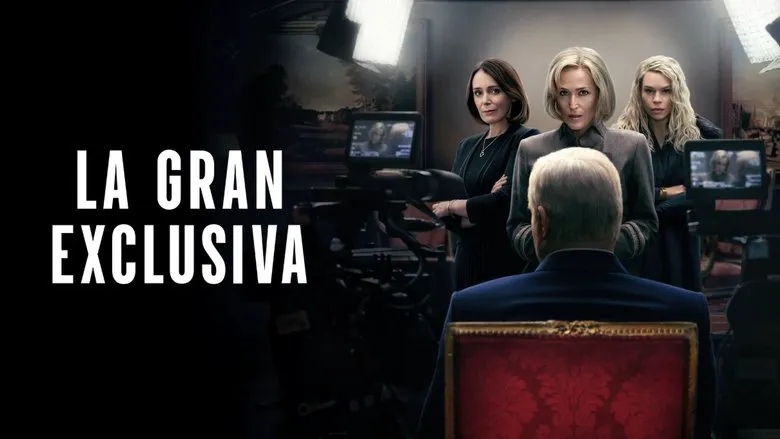Woody Allen’s “Scoop”: A Commentary on “Match Point”
If the dramatic “Match Point” was a reaction to many of Woody Allen’s own tiresome comedies leading up to “Hollywood Ending,” then the comedic “Scoop” is a direct response to “Match Point” and doesn’t work without it. It’s as if it comments on “Match Point,” without negating it, which gives the commentary additional (dialogical) value. However, “Scoop” sags towards the end. The witticisms become tiresome. The society gossip becomes tiresome. The game becomes tiresome. You just want it to end, because it’s becoming very, very boring.
When a person has directed as many films as Woody Allen, the question of motive (“why bother again?”) inevitably arises. Someone who isn’t Woody Allen might make films for money, out of spite, or out of boredom. But he has found a way to maintain his interest in the work. It’s like the old joke about the professor who can prove one hypothesis in half an hour, and then prove another, opposite hypothesis in the next half hour. Or like the chess player Alekhine, who would first win a game with white pieces, then turn the board around and find a winning move for black in the existing position, and then turn the board around again and find another…

In any case, if the dramatic “Match Point” (2005) was a reaction to many of his own tiresome comedies leading up to “Hollywood Ending” (2002), then the comedic “Scoop” is a direct response to “Match Point” and doesn’t work without it. And this working premise is in itself witty, as well as fresh and new in the entire “historical” sphere of “personal creative paths.” Because it’s clear that the old script for “Scoop,” according to Allen, was only a “modern,” “senile” parallel to “The Curse of the Jade Scorpion” (2001) without any uplift. Just a portion of Allen’s signature witticisms: “You always see the glass as half empty.” “Half full. Of poison.” Their slightly increased density: not only the old man is witty, but also the girl is actively witty (“And stop calling me the product of your loins”), which wasn’t the case, for example, with Helen Hunt. A return to complete convention: the “living” purgatory is akin to the sperm bank of 1972.
The Scarlett Johansson Effect
But after meeting Scarlett Johansson, everything completely changed. Apparently, Allen really likes her, if he kind of paid her back for the misfortunes of “Match Point” with the “sensational” well-being. The plot itself became denser, joining the game of “find ten similarities against the background of ten differences” and harmonized in connection with this by the science of Gestalt psychology (if anyone remembers the black and white contour). “Scoop” is as if commenting on “Match Point,” without negating it, which gives the commentary additional (dialogical) value. And what is most attractive in it is not so much the “flickering” of ideas (“if there is no afterlife, everything will be immoral, and if there is an afterlife, everything will be politically correct”), but the new arguments that concretize the situation. You start laughing at the credits not only because “Dance of the Little Swans” is in itself terribly funny music, filled with a mass of associations from childhood. No, rather it is clear that the main thing here will be the dance, ballet steps and girls, while in “Match Point” there were Italian opera tenors. This global opposition of “opera-ballet” gives a funny anticipation.

Ballet vs. Opera: A Shift in Perspective
In ballet, there is no and cannot be the operatic “rock,” the “force of destiny” (luck), but the emphasis is on constant updating of technique. It’s funny to watch how easily the “fateful” pattern changes. The poor American actress Nola quite calmly became the student journalist Sondra, portraying a rich American actress in London, the poor murderer Chris merged with the rich aristocrat Tom and turned into Hugh Jackman, one murder - into serial murders, which in fact are still - one (only Nola repainted), etc. All the same, only in a different key. The impeccable command of detective technique in any key turns the very concept of “rock” (luck) upside down. First, you just need to know how to swim, and everything will work out for us, regardless of the weather. Secondly, reality is generally beyond morality, if a dead man (Ian McShane) dominates in the “ballet.” He works even in the coffin. This is the apotheosis of the “technician,” the “pro,” when you don’t care about money, fame, position and other cheap things, and the whole game is only for interest. The reality of interest easily argues with the reality of winning. But the funniest argument is that it is possible that Nola did not die from a bullet. One old, frail neurasthenic would have been enough - and Jonathan Rhys-Meyers would not have succeeded. The fact that Allen decided to defend Scarlett with his own frail chest is also an unfinished dispute between the rabble, the genius and the beauty.
The Inevitable Onset of Boredom
But boredom is the key to all games, dramatic and comic. Despite everything, “Scoop” sags towards the end. The witticisms become tiresome. The society gossip becomes tiresome. The game becomes tiresome. You just want it to end, because it’s becoming very, very boring. And here again, only “intertext” saves the film from a serious death. Remembering how easily “Match Point” shone through Dreiser, Allen ridiculed both him and himself with “Scoop.” Lake. Boat. Swans. Three. Seven. Ace. Dance of the Little Swans. Attempted drowning. Clyde Griffiths. Queen of Spades. Laugh, clown. And everything came together just as perfectly, that is, the genius is alive only by momentary perfection, and the beauty with the rabble can smoke in the corridor.

Woody Allen’s 41st film, “Scoop,” is made for everyone without restrictions. Girls will again secretly fall in love with the gentleman Jackman, boys will again mentally fuck Johansson in a red swimsuit, the intelligentsia will join the old magician. And only those who remember Boris Lavrenev’s story will sympathize with the magician.
How difficult it will be for him to answer his own “Scoop.”